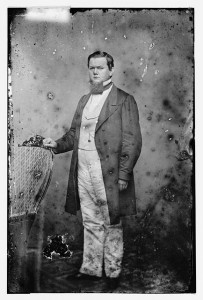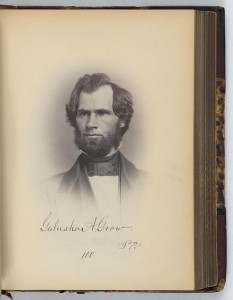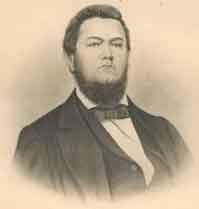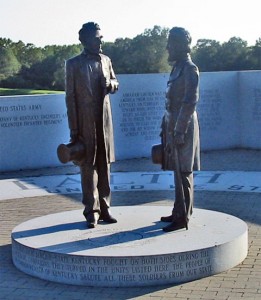During the same U.S. House session in which Clement Vallandigham criticized the Lincoln Administration, two representatives from the Border State of Kentucky expressed opposite opinions on Secession and the North’s response. From The New-York Times, July 11, 1861:
HOUSE OF REPRESENTATIVES.
WASHINGTON, Wednesday, July 10. …
Mr. BURNET wished to be indulged in a few, remarks, to which there were no objections.
He said, I am perhaps one of the few members who think not only that the commencement but the prosecution of the present war might have been, or might now be avoided, by proper efforts on the part of the National Administration. Entertaining this opinion, I am one of those indisposed to resort to the force of the cannon, bayonet, and sword, under any circumstances, believing under the theory of our Government that the Union can never be held together in that way. Hence it is my purpose, representing a Congressional district of Kentucky, to oppose both by my voice and vote every movement that looks to the prosecution of the war against the Southern States which have seceded. These being my views and sentiments, I cannot and will not, under any circumstances, give my vote for measures which look to the involvement of our common country in a bloody struggle, the results of which to both sections will be the destruction of their material and best interests, and the prostration of Republican Government on this continent.
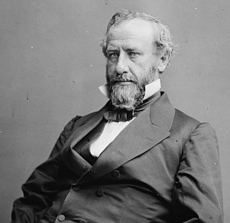
(Constitutional) Coercion fine to maintain Government and Constitution - Robert Mallory (LOC - LC-DIG-cwpbh-03572 )
Mr. MALLORY — I have risen simply to protest, in the name of Kentucky and her Union representatives, on this floor, against the remarks made by my colleague (BURNETT.) Kentucky, by a large and overwhelming majority, will support and maintain the Government and the Constitution of the United States. (Applause on the floor and in the galleries.]
The Speaker quickly reminded gentlemen that the applause was in violation of the decorum of the House, and he would insist on the enforcement of the rules. He hoped the House would sustain him. He had no desire to clear the galleries, but if the disorder therein was repeated he would feel it his duty to do so. He trusted that all the spectators present would respect the proprieties of time and occasion, and remember this was not a theatre. [VOICES — “That’s, right.” “That’s true.”]
Mr. MALLORY resuming, said: I do not desire to make a lengthy speech. I insist that what I have stated is the opinion of Kentucky in this unfortunate state of affairs. We in Kentucky believe that the peril, the danger, the destruction, and the ruin of so many material interests, have been brought about by these very seceding States of the South, which seem to excite the sympathy of my colleague. This being my opinion, and that of Kentucky, I am authorized, I think, to say to this House and the country that the people of Kentucky, through her Union Representatives on this floor, stand ready to support the Government of the United States by every constitutional means to which it may be thought proper to resort, for the maintenance of the Government and the Constitution. [Applause.]
The Speaker said he would direct the Seageant-at-Arms to arrest any gentleman who should repeat the demonstrations of applause.
The Wikipedia article about Henry Cornelius Burnett can also be read as an overview of the conflicts in Kentucky in 1860. Here’s a couple paragraphs about Burnett:
Besides championing the Southern cause in Congress, Burnett also worked within Kentucky to bolster the state’s support of the Confederacy. He presided over a sovereignty convention in Russellville in 1861 that formed a Confederate government for the state. The delegates to this convention chose Burnett to travel to Richmond, Virginia to secure Kentucky’s admission to the Confederacy. Burnett also raised a Confederate regiment at Hopkinsville, Kentucky, and briefly served in the Confederate States Army. Camp Burnett, a Confederate recruiting post located two miles west of Clinton in Hickman County, Kentucky, was named for him.
Burnett’s actions were deemed treasonable by his colleagues in Congress, and he was expelled from the House in 1861. He is one of only five members of the House of Representatives ever to be expelled. Following his expulsion, Burnett served in the Provisional Confederate Congress and the First and Second Confederate Senates. After the war, he was indicted for treason, but was never tried. He returned to the practice of law, but died of cholera in 1866 at the age of 40.
was elected an Opposition and later Unionist to the United States House of Representatives in 1858, serving from 1859 to 1865, being unsuccessful for reelection in 1864. There, Mallory served as chairman of the Committee on Roads and Canals from 1859 to 1863. He was a delegate to the National Union Convention in 1866 and was one of the vice presidents of the Centennial Exposition in 1876.
Galusha A. Grow was nominated by Thaddeus Stevens for Speaker at the House session that started on July 4, 1861.

